Guided meditations for sleep and relaxation
Sleep is an essential part of our lives, and not only because we literally wouldn’t be able to function properly if we haven’t slept. Not sleeping enough or sleeping too much can damage our physical and mental health. Sleep deprivation can lead to a lack of energy, a bad mood, and slowed thinking, as well as some more severe conditions, such as depression, heart disease, diabetes, or obesity.
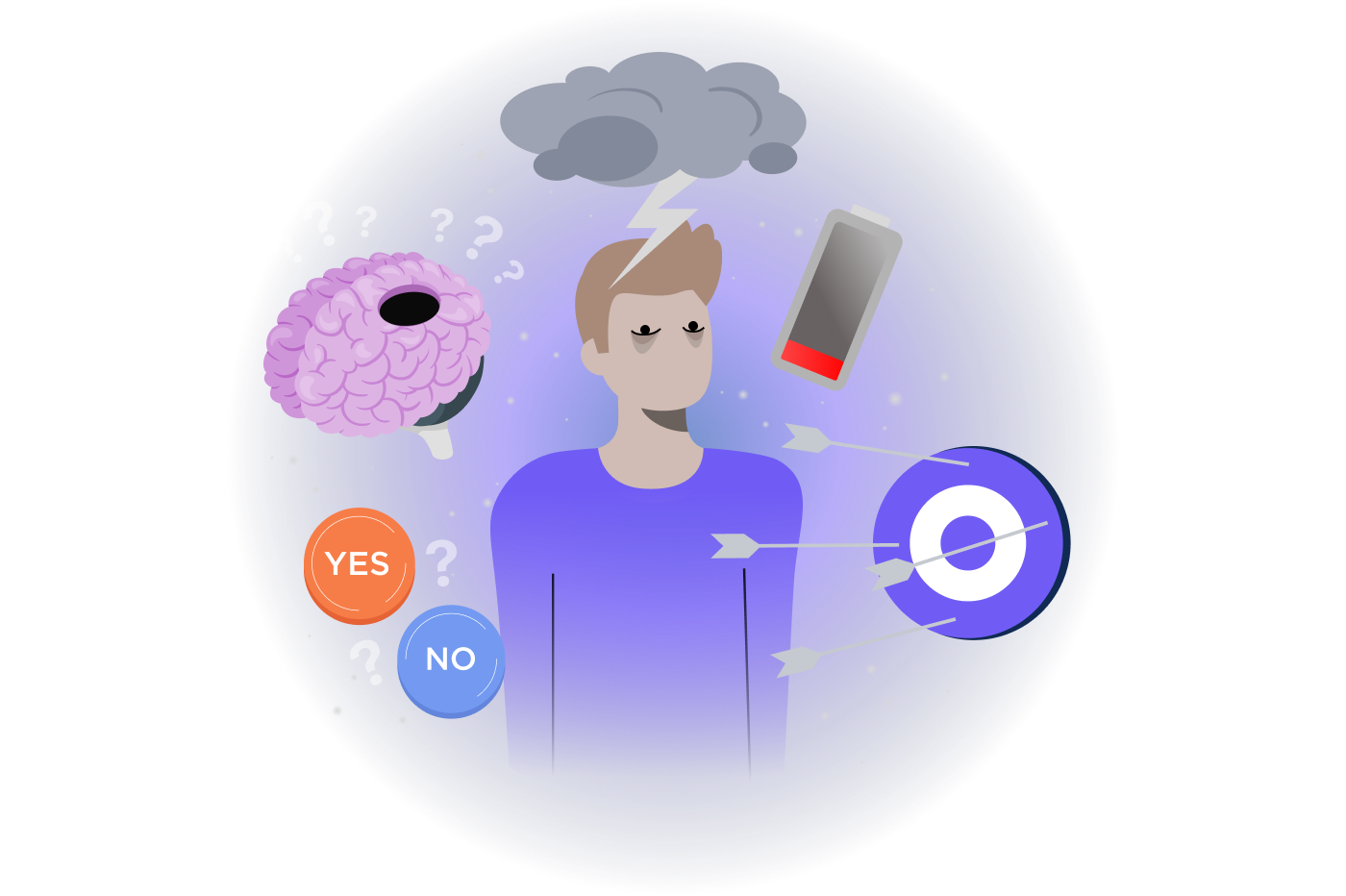
Lack of sleep also prevents your immune system from building up its forces, so if you want to stay healthy, you should make sure to get enough quality sleep on regular basis. Have you ever heard that sleeping just 4-5 hours a day for most of the year and then getting a good night of sleep now and then is enough to maintain a healthy body and mind? Nothing more wrong. The right amount of sleep depends on your age. For an adult, it’s at least 7 hours though, and for a teenager 8 hours. So sleeping 4-5 hours a day, no matter how cool it might seem to have that additional time for yourself, simply won’t do if you want to stay healthy.
However, sometimes it seems that we don’t have a say in that matter. We’d love to go to sleep and get a full 7 hours of rest, maybe even more, but for some reason, we cannot fall asleep, we keep waking up or can't enter REM sleep. Perhaps you’re there too. Tossing on the bed, turning from side to side, getting up to drink water or get some air, only to get back to tossing and turning.
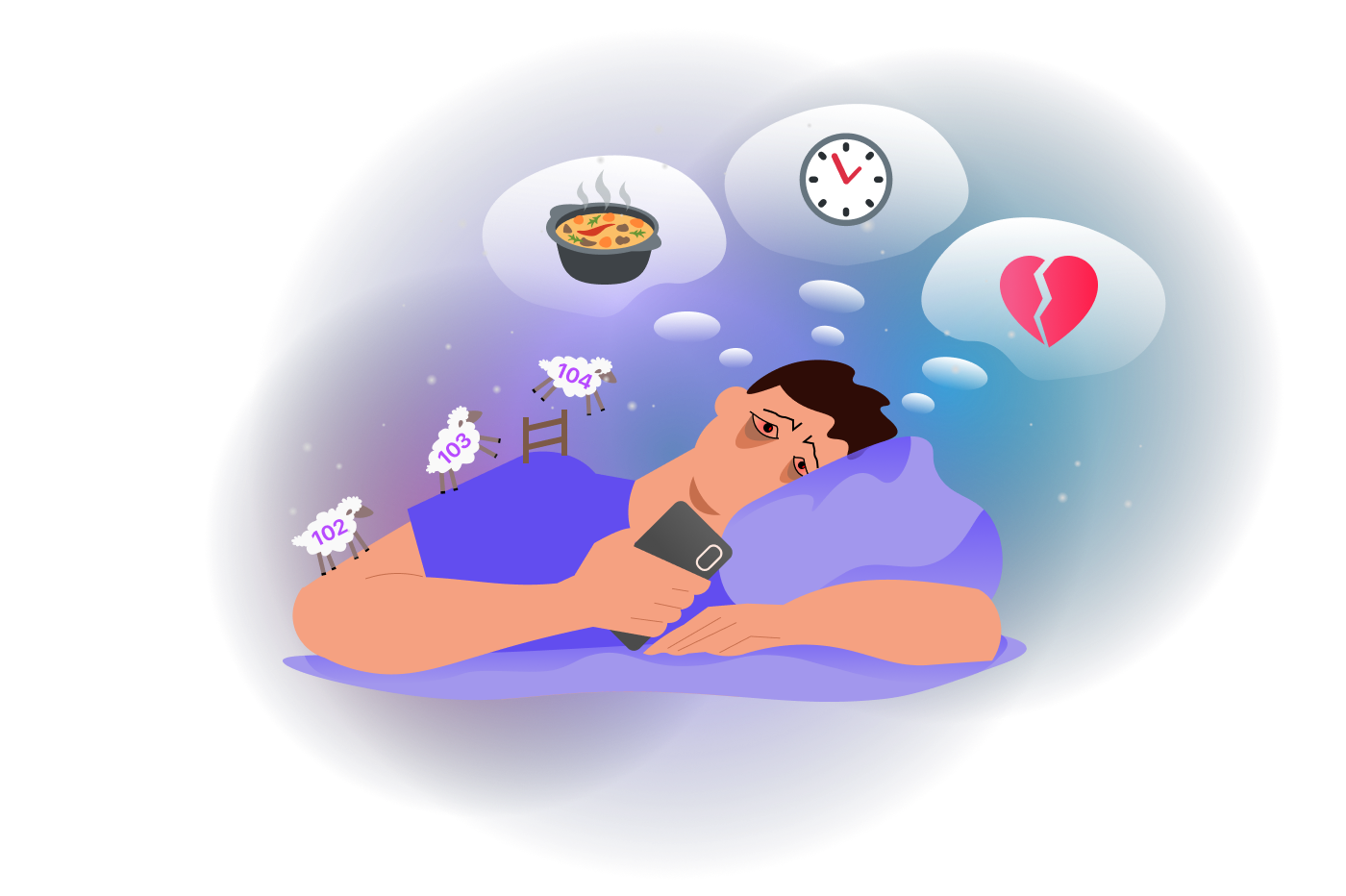
Does that sound familiar? Sometimes it happens because we’re not tired enough, sometimes because we’re anxious or stressed about something that either happened on that day or will happen the next, and sometimes we simply cannot relax. You’re not alone. Many people struggle with intrusive thoughts at night. But how to deal with them? Is there anything we can do?
Yes! Sleep issues and intrusive thoughts are often brought up by stress and anxiety. There is a lot of things that can trigger tension and make us more alert, which in turn makes it impossible to sleep. No matter what set off the stress response in our bodies, we can fight it off if only we evoke a relaxation response instead.
One of the most popular and efficient ways of dealing with insomnia, eliminating worrying from your sleep routine, and falling asleep fast is meditation. How does meditation help in relaxing your mind? What is the best-guided sleep meditation? Find out below.
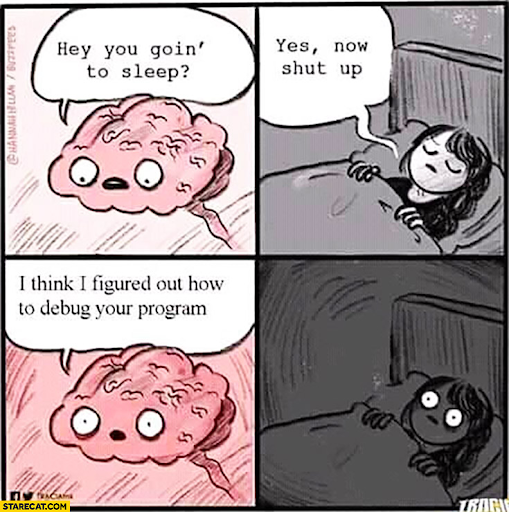
How can meditation help you sleep?
Since meditation is known to be very helpful when it comes to dealing with anxiety and stress, it may not be surprising for many people that it also supports better relaxation and sleep.
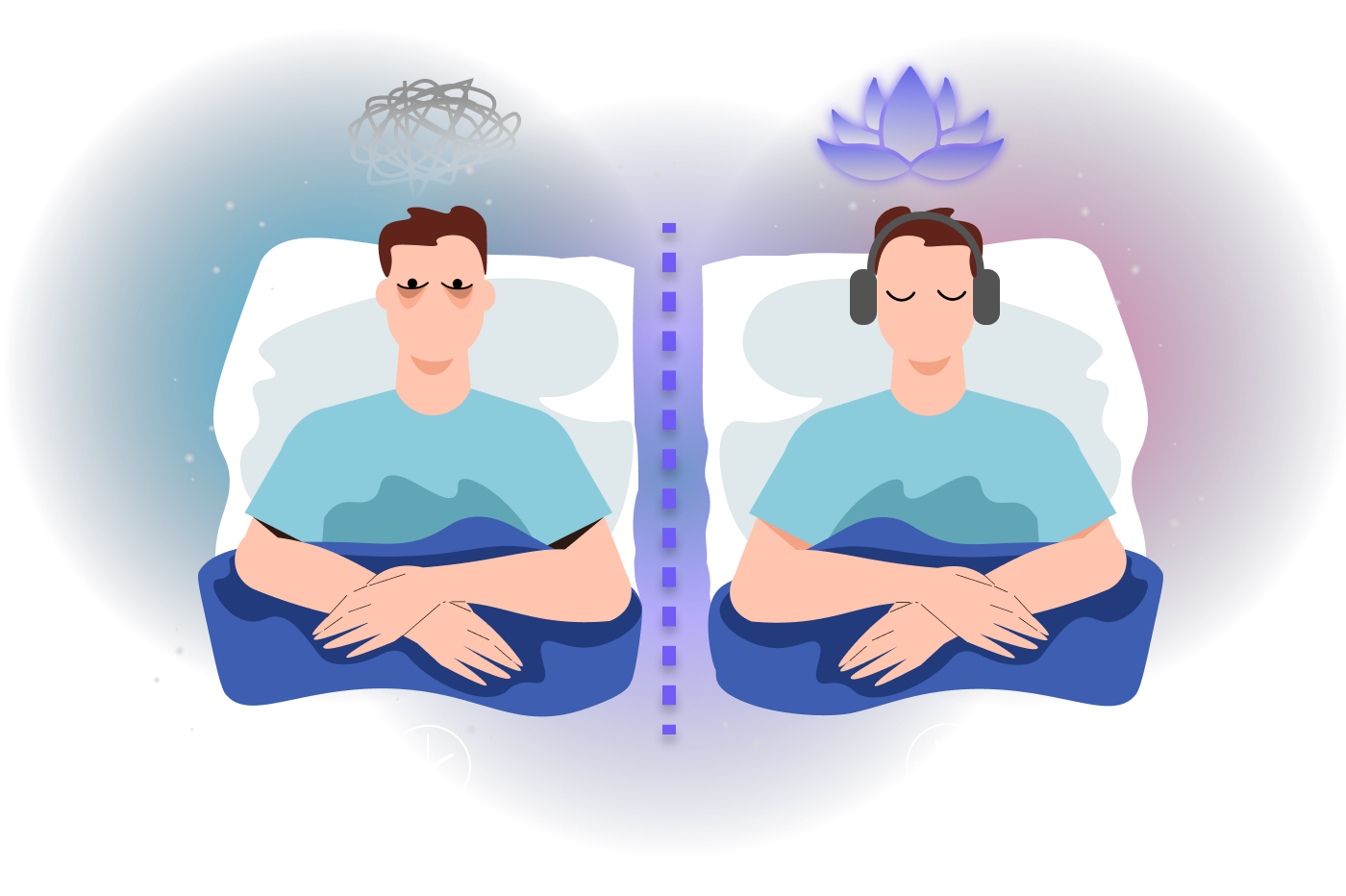
Research has shown that one-third of adults have trouble falling asleep due to chronic insomnia (a disorder that is responsible for difficulties in falling and staying asleep) and that most of the problems connected to sleep come from stress and anxiety. We live in a very fast-paced world and we are faced with obstacles, demanding, and even nerve-wracking situations each day of our lives. We stress about work, studies, our families, partners, money, the general status of the world and so much more that it’s actually surprising that only 35 to 50 percent of adults worldwide regularly experience insomnia symptoms and not more. That number is still high though and it’s about time we’ve started dealing with it.
“A lot of people with insomnia go to bed because they’re tired of dealing with the day and they want to escape, but that’s not how the brain regulates sleep and wake. Meditation helps keep you from getting in your own way and it allows your brain to regulate sleep and wake based on how it naturally does.”
This is why meditation works like a charm when used for relaxation and sleep. According to researchers, even as much as 15 minutes of meditation per day makes you feel as relaxed as if you were on holiday. A comparative study was conducted on a group of novice meditators and vacationers and it showed that meditators exhibited a more significant increase in mindfulness than people on holiday. Studies say,
“Depressive symptoms and perceived stress decreased for both groups, with no significant differences between them. Both groups showed an increase in self-reported vitality, again with no differences between them at the end of the resort stay.”
It's probably not a stretch to say that we all know how beneficial holidays are for our health and for stress relief. But you cannot go on holiday every single day of the week. What you can do is meditate each day. So, we know that meditation helps with anxiety and stress, but how does it help with sleep? It's simple. Meditation increases melatonin (the sleep hormone) and serotonin (precursor of melatonin), reduces heart rate, decreases blood pressure, activates parts of the brain that control sleep, and minimizes how easily you’re awakened. Moreover, it has been proven that meditating may reduce pain. So if you have trouble sleeping because of your medical condition, chronic pain or even if you're experiencing anger or worry about your condition or pain, meditation may reduce these negative effects on your body and mind and bring you a night of better quality sleep.
Research shows that even though various types of meditation can help improve insomnia, and may even improve sleep quality for those without existing sleep problems, Mindfulness meditation appears to be especially beneficial when it comes to sleeping problems.It has been noted that Mindfulness meditation improves sleep quality and reduces daytime disturbance in people with chronic insomnia and older adults. According to research published by the Journal of The American Medical Association (JAMA) mindfulness meditation is an especially effective way of treating insomnia in older adults.
If you’re at the beginning of your journey, however, you may feel a little bit lost and confused by all of this. You may ask yourself how to practice better sleep meditation? What exactly should you do to meditate for relaxation and achieve blissful deep relaxation or a more restful sleep?
There are a few steps you should consider taking in order to succeed in your meditation and improve the quality of your sleep hygiene.Below you'll find some tips on how to meditate for a rested mind and good quality sleep.
How to meditate to relax?
Before meditation, you might want to make sure that you have set up the right environment.
Remove distractions - turn off the TV, make sure other housemates are out or asked not to interrupt, aand makes sure all the cell phones are in another room or in any other place from which it won't distract you. It’s best to at least dim the lights, and make sure that you are in a quiet space that will allow you to focus.
Choose the right position or in other words: get into a comfortable position, one that will stop you from fidgeting and won’t make you uncomfortable after a few minutes. If you can’t have your phone hidden or in another room because you use it in your meditation practice, turn down the screen brightness and close all other apps or tabs on your device.
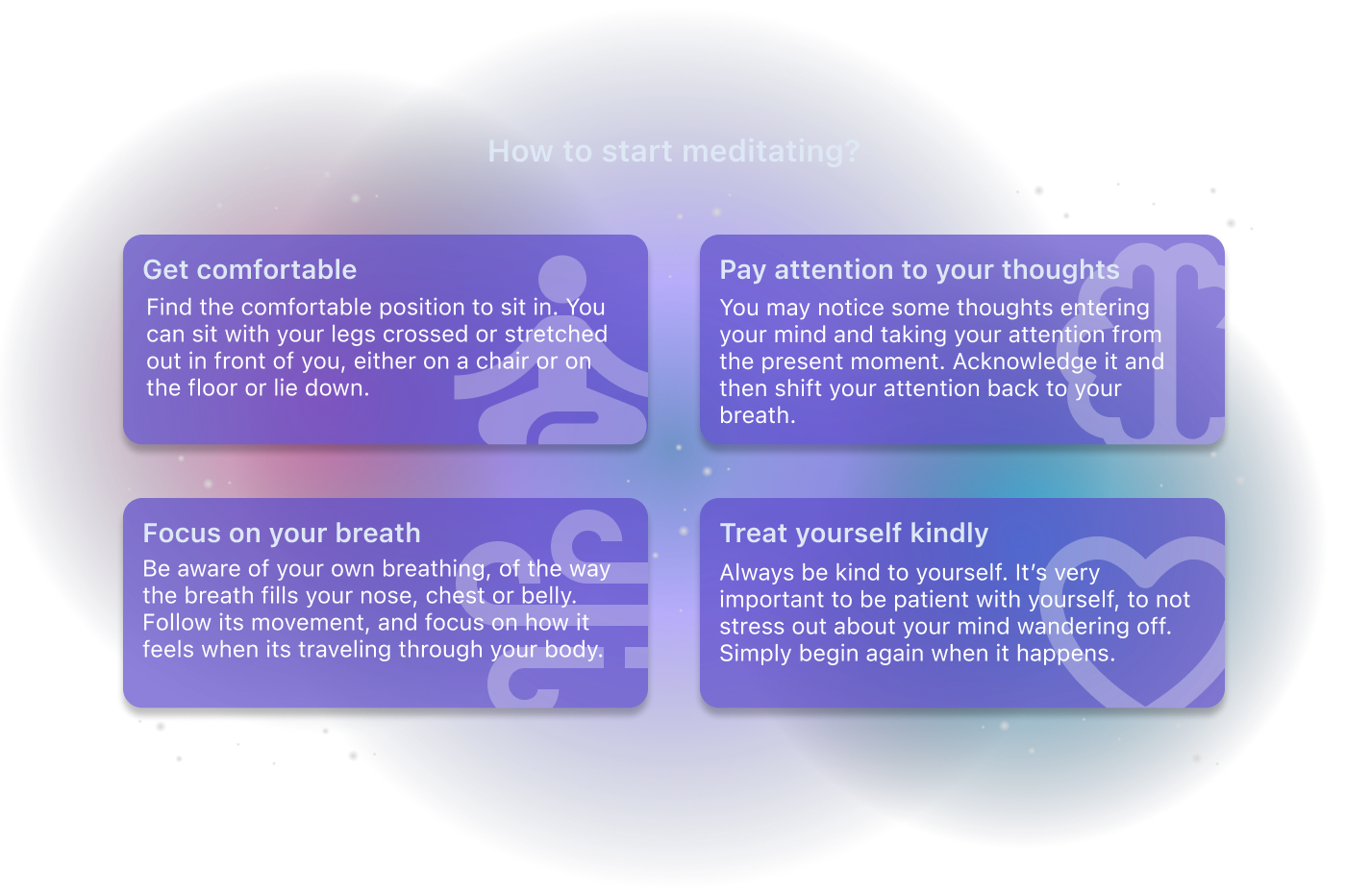
Remember, it's crucial to keep your environment free of distractions, especially if you have trouble focusing or have an overactive mind.
At the beginning of your journey, you’ll find out that there are a lot of meditation methods that can help you relax your body and mind before sleeping. As was mentioned before, Mindfulness meditation is an excellent method that can help you find peace and calm your mind, however, it's not the only one. Mantra meditation, mindful body scanning, soothing music meditation, breathing meditation, concentration meditation, gratitude meditation and even deep sleep guided meditationsleep guided meditation, to name just a few.
Body Scan meditation - focus on the present state of your mind and body. To practice it, sit comfortably, close your eyes and focus on your head. Notice how your forehead feels, then move to your nose, ears, then your mouth, and so on. Keep focusing on different parts of your body, noticing every sensation in your body, from head to toes. Continue doing this until you've done your whole body. If you want to stop there, stop, if not keep going from your toes up to your head, again focusing on each and every part of your body.
Concentration Meditation - also thought to be an excellent way of calming down your thoughts and bringing peace to your mind. To practice it, you need to pick a specific subject - physical, visual, aural, or mental - and concentrate on it. It can be anything from a flickering candle to an audio track of ocean noises, or a mantramantra that you repeat (such as “ohm” or “ah”), or just a concept, the idea of love, or a specific color. Just observe what you see and relax your mind - don’t try to describe it all to yourself or write an essay on this subject in your head, just absorb.
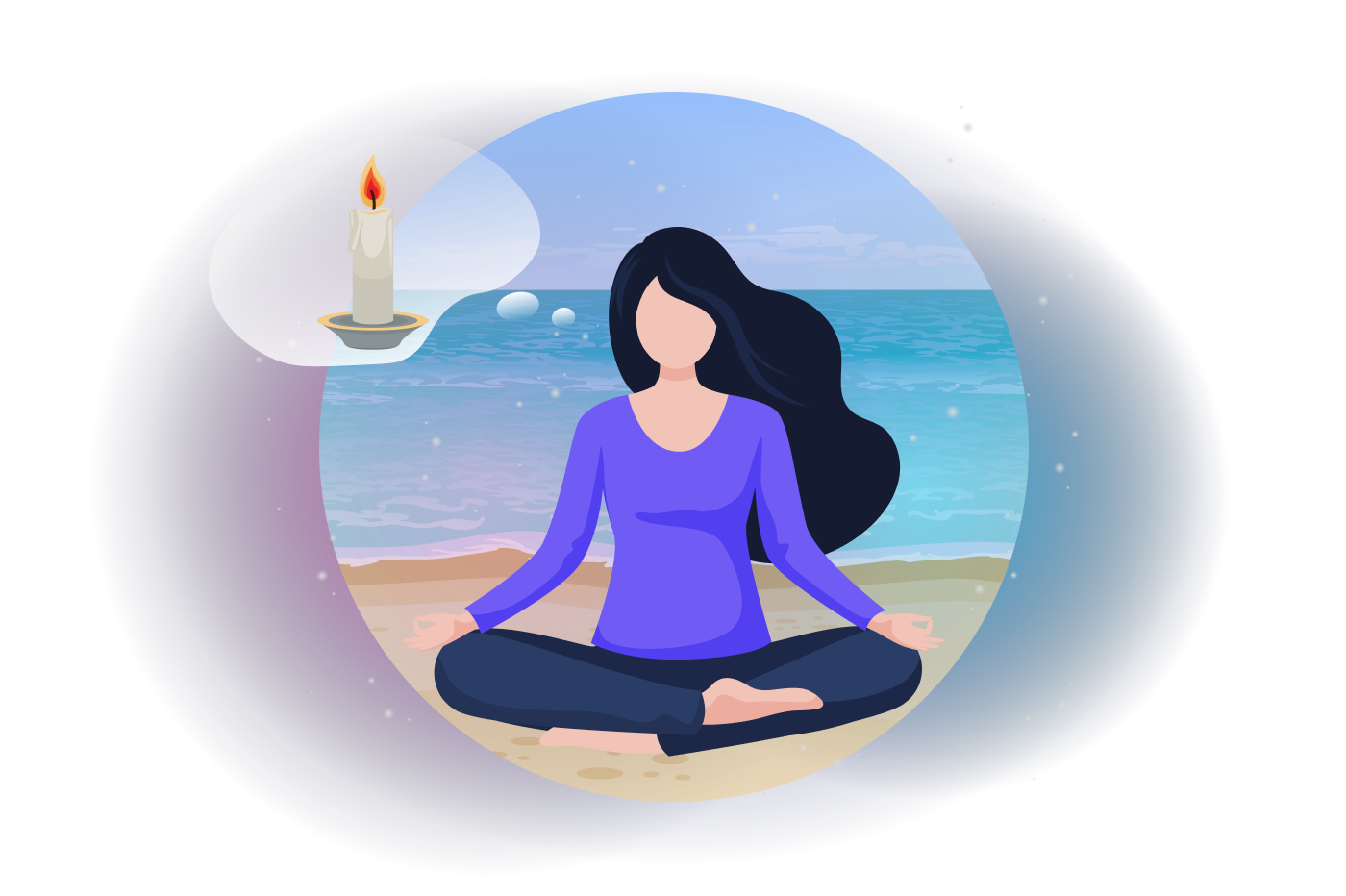
Breathing meditation is one of the most popular meditations out there. But did you know that there are many ways in which you can practice it? There is box breathing, which requires you to lay down, breathe in for a count of 4, and then breathe out while counting to 4 again. There is Diaphragmatic breathing, also called belly breathing, in which you focus on breathing in and out through your belly - deep breaths that can be practiced with a hand on your belly. This practice, apart from increasing relaxation and reducing stress, can help you strengthen the diaphragm and increase the efficiency of your breathing. You can also use the 4-7-8 breathing technique, which helps control the speed of your breath. It requires you to put the tip of your tongue on the roof of your mouth (keep it there for the whole exercise), and then breathe in through your nose for 4 seconds, hold your breath for 7, and then exhale for 8 seconds.
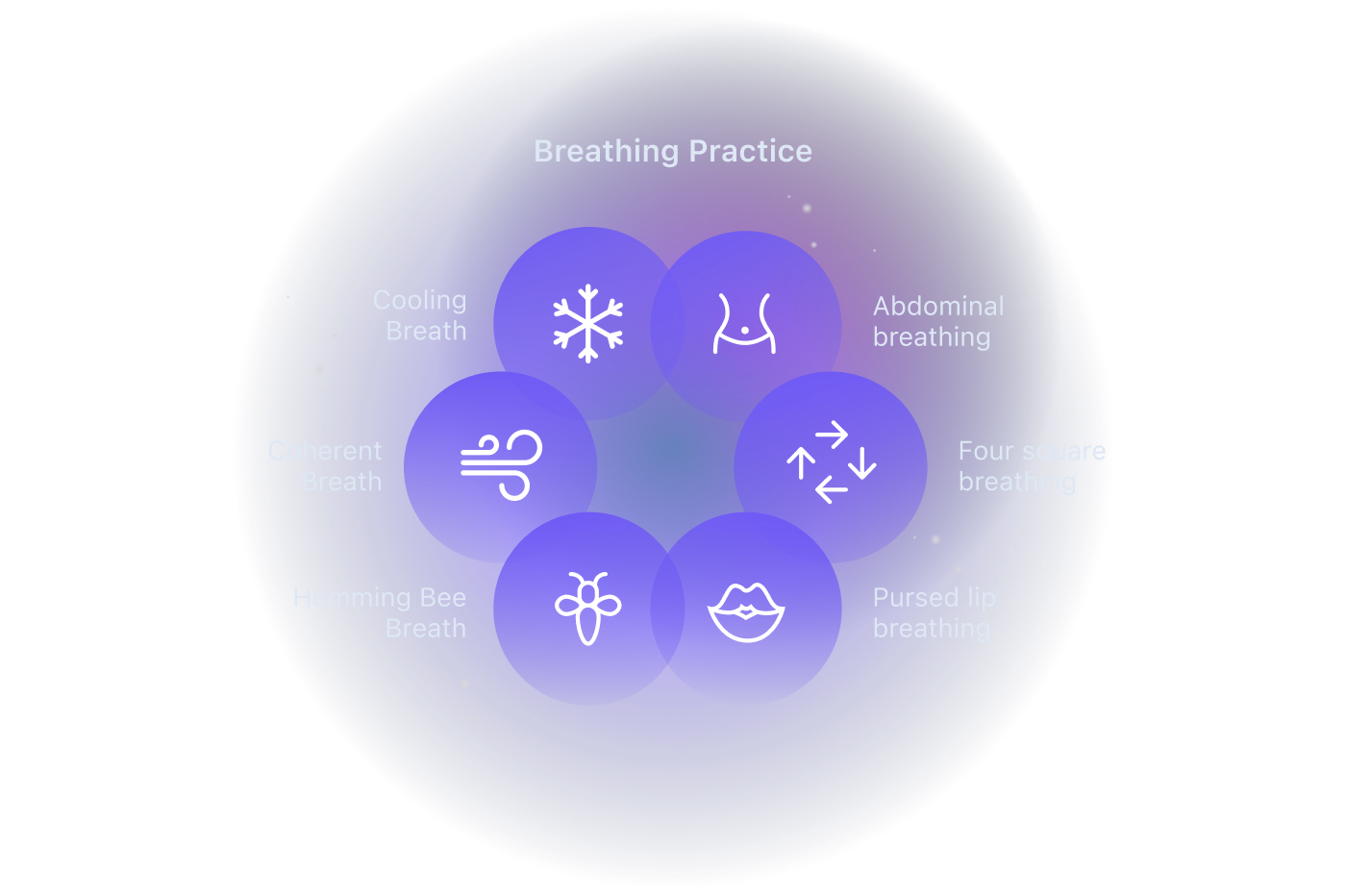
These are only a few examples. There are many other exercises that you might find on the Internet - the crucial thing is to keep looking for the solution that helps you. It doesn’t have to be the most popular one, nor the one some YouTubers tried, it has to be the one that works best for your mind and your body. So, try as many meditations for sleep and End of Day Meditations as you can.
What to think about when meditating?
Most of the sites that talk about meditation will advise you to think about breathing while you’re meditating. It’s one of the most popular techniques when it comes to meditation - focus on the breath and if you feel your mind wandering, simply notice it and redirect your focus back to the breath. You can also pay attention to your body as was shown above when we talked about Body Scan meditation. Similar to the breathing one, while doing a body scan you can also focus your all attention on experiencing the present moment, just being in the moment. Mindful. Present.
These are pretty popular, but if you find it hard to focus on breathing or noticing sensations in your body, there are other things you may think of while meditating. You may think of your emotions, of what you’re feeling at the moment, trace these emotions back to their cause. Think about your goals or about how inspired you feel in the present moment or answer yourself the question of what do you care about. While you’re breathing you may as well focus on breathing in positive emotions like love, compassion, and inspiration, and on your exhale to expel negative emotions from your body, such as stress anger, or resentment.
If you want to focus on a particular object, you may pick up a rose and meditate in front of it (this is a simple meditation from “The Monk who Sold His Ferrari”), appreciate its beauty, notice the colors, the fragrance, the softness of the petals and the dangers of the spikes. Just as it was mentioned before, it is important not to voice any thoughts on the matter, not to judge, just simply observe and note.
Free meditations for peace of mind
If you struggle to maintain your own meditation practice, you can always turn to guided sleep meditations and guided meditations for relaxation. Having a professional lead you through all of the steps may be a good way to start your meditation journey, and it is also highly recommended for all beginners. If you’re worried that having someone talk you through it won’t work - don’t be. Not every meditation method or technique works for everybody. It is important to try though. It can also make your first contact with meditation easier and more rewarding. And since nowadays you may find a lot of free meditations, nothing is stopping you from trying it out.
Here is what you can do:
At bedtime, try listening to a recording of guided sleep meditation. You may listen to meditation podcasts or online streaming services, like Spotify. If you feel like going out for a walk you may as well try your local library or visit some online websites, and if you feel like installing an app, you might want to try, for example, Take3Breaths App.
It offers guided meditation for sleep and relaxation, guided meditation for managing stress and anxietymeditation for managing stress and anxiety, guided meditation for increasing productivity and creativity, as well as breathing exercises.
Updated: 14.10.2022
- +What is the best type of meditation for sleep?There are a lot of meditation techniques that can help you with sleep. You can practice Mindfulness Meditation as it is believed to improve sleep quality and reduce daytime disturbance in people with chronic insomnia, or you can listen to a gong meditation.
- +Is guided sleep meditation good for you?Research shows that practicing sleep meditations regularly improves sleep quality and helps you stay asleep through the night.
- +Can meditation cure sleeplessness?According to research, meditation can cure insomnia and improve sleep quality, as well as reduce daytime disturbance for people with chronic insomnia.
- +How can I fall asleep fast and peacefully?To fall asleep fast and peacefully you may try to get rid of any distractions, such as your phone, practice yoga, meditation, or mindfulness, choose the right position, and listen to relaxing music.

 Take3Breaths
Take3Breaths

